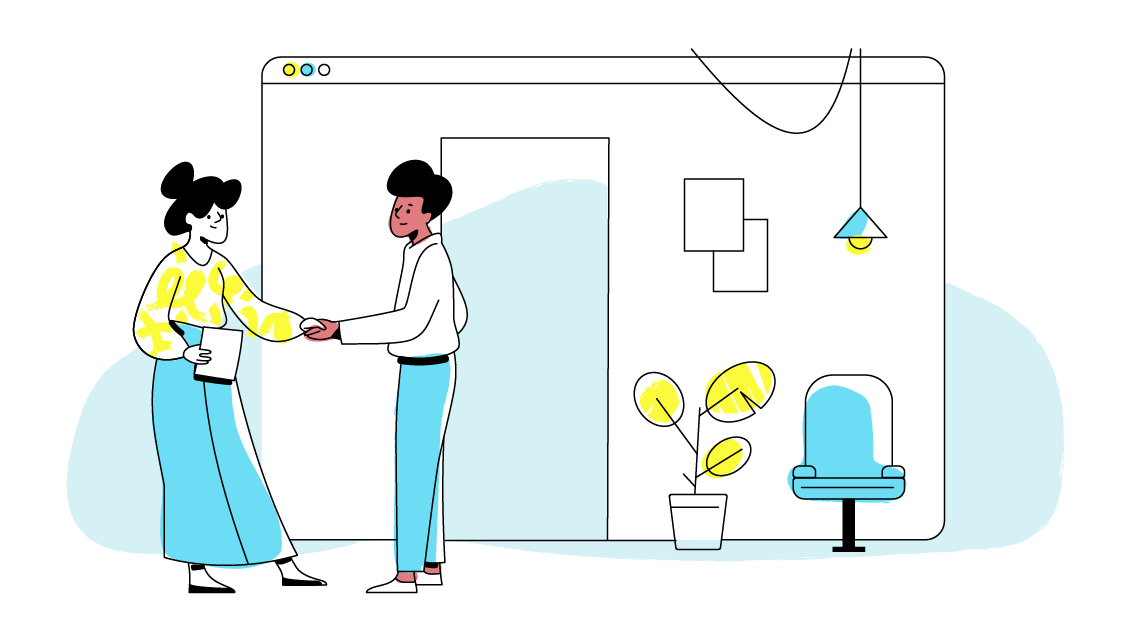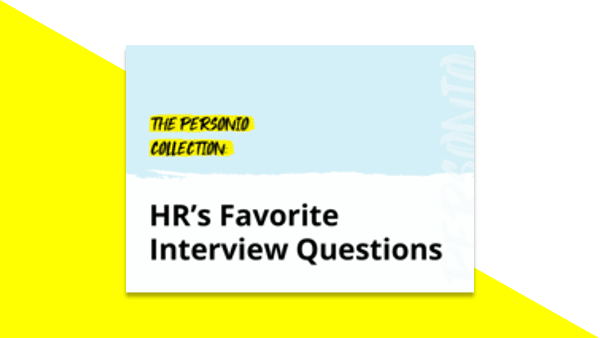List of Questions and Preparation for a Structured Interview

Structured interviews are structured for a reason. They are an easily-replicable, consistent, and thorough assessment of whether a candidate is a fit for a role. It goes hand in hand with recruiting which, if you want to learn more about that, we suggest you read our comprehensive guide to recruiting.
So, what kind of structured interview questions will help employers find the right candidate? In this article, we offer some examples, as well as examples of structured interview questions you can use as a template today.
Contents
- 1What Should a Structured Interview Look Like?
- 2What Is a Good Introductory Interview Question?
- 3Standard Interview Questions – A Good Way to Begin
- 4Which Structured Interview Questions Can You Use to Test Soft Skills?
- 5Provocative Structured Interview Questions
- 6Which Structured Interview Questions Are Off Limits?
- 7Future Prospects
What Should a Structured Interview Look Like?
Of course, the list of questions must first be discussed internally and matched to the job profile. There are some standard questions that are suitable for pretty much any interview. More important, however, are those that are designed to draw out the candidate and have been specifically developed for the requirement profile.
Every question asked when conducting an interview should have a purpose and a goal, and provide information about candidates' soft skills. It is precisely these "soft" characteristics, such as initiative or resilience, that will help you decide whether an applicant is compatible with your company.
What’s The Difference Between A Structured and Semi-Structured Interview?
It’s all in the name! A structured interview is designed to offer a very rigid and understandable template for an interview. It is best implemented when either trying to scale, and hire a lot of people, or interviewing for very specific or ‘testable’ hard skills (like different coding languages for a developer, for instance). A semi-structured interview, on the other hand, is more of a conversation and can test both soft skills while allowing interviewees to explore ideas.
What Is a Good Introductory Interview Question?
It might sound banal, but people often do not take it into account enough: In order to find out whether you can “work together,” it is important to know your own values: What defines your company? What are your goals for the next few years? Only those who know what they are looking for can identify the “right” candidate.
And it is not just the questions you ask when giving a structured interview, but also the environment in which they are asked that is important. There is, for example, a big difference between a candidate facing a seven-person interview panel in an ornate conference room and a one-on-one chat with someone from HR in a relaxed atmosphere.
Who should take part in these discussions? Who is essential? At Personio, for example, there are up to five interviews with different people at each stage (with a specific purpose for each).
Standard Interview Questions – A Good Way to Begin
First of all, when giving a structured interview, it is worth asking some standard questions to get things going; they can break the ice and get the communication started.
For example, you could ask your interviewee what they know about your company and why they want to work for you. You will be able to tell very quickly from their answers whether the candidate has any real interest in your company.
Asking about strengths and weaknesses when interviewing someone for a job is a popular choice. “Can you tell us something about your weaknesses?” reveals more than simply asking “What are …?” Does the candidate describe their weaknesses in a differentiated and self-reflective manner, or do you get the feeling that they are repeating a list of points they have memorized in advance?
If you ask about failures, make sure that they take responsibility for the failure mentioned and reveal what they learned from it. Or, do they blame colleagues or supervisors for their own failures?
The question of role models can also be illuminating, as can asking why they chose their particular profession: “What made you choose this particular career?” If the applicant replies that they were following their parents’ wishes, this tells you something very different than if they say they are pursuing their vocation.
Touching on personal interests can relax the atmosphere and help the candidate open up during a structured interview. “What are your greatest passions?” or “What do you like to do in your free time?” are innocuous questions, but the answers can tell you a lot about the applicant’s drive, goals, and passions.
Candidate Evaluation Made Easy

Let your interviewers give feedback on the candidate centrally in Personio and make faster hiring decisions due to having all information in one place.
Learn more hereWhich Structured Interview Questions Can You Use to Test Soft Skills?
So, what is a structured interview, and what is its key purpose? The main idea is to try and get a better read on an applicant’s ‘soft skills.’ These qualities can include the ability to work as part of a team, creativity, resilience, diligence, and the ability to take criticism.
It is precisely these soft skills that you can test by asking certain questions when facilitating a structured interview for just about any position:
Showcasing Teamwork
If you are faced with a tricky problem, how do you approach it: by yourself or with the rest of your team?
How would you sum up the way you work with other people?
What role do you tend to play in a group?
What type of person do you enjoy working with?
What type of person do you not enjoy working with?
You are heading up a project. Which departments would you bring in, and how would you go about that?
The applicant’s answers will give you some indication as to whether they can think as part of a team and whether they are open to suggestions from others. They also show whether the applicant is able to delegate effectively.
Creativity
You are a project manager, and half of your team is off sick with the flu. But you have a schedule you need to stick to. What do you do?
What do you do when there doesn’t seem to be a solution?
In previous jobs, how have you had to work creatively?
What freedoms are important to you in your job?
In which situations are you most creative?
What situations constrain your ability to work creatively?
These structured interview questions, and their following answers, will show you whether you are dealing with someone who can think creatively – and also whether creativity is a particular strength of theirs in stressful or time-critical situations.
Resilience
What stressful situations have you had to deal with in your professional life thus far?
Have you ever failed at something? How did you deal with that?
Do you consider yourself to be resilient? What makes you say that?
You are heading up a project, and you know that most of the people involved do not have a great deal of faith in you. How would you deal with that?
The answers to these structured interview questions for managers will give you some idea of how the candidate behaves under pressure. More importantly:
Do they remain level-headed?
Are they able to deal with stressful situations professionally?
Can they work with others intelligently and appreciatively, despite being under pressure?
Diligence
What does working carefully mean to you? Could you give me some examples?
How do you check your work for errors?
You are working on a time-critical project. What is more important to you: scrupulously meeting the deadline or delivering quality work, even if it means you miss the deadline?
These structured interview questions for employers are designed to make the applicant reveal their true character: Just how diligent are they? Would they sacrifice quality to meet a deadline?
The Ability to Take Criticism
You have applied for a position here. What made you leave your previous position?
Is there a particular aspect of yourself that you would like to develop further?
Your whole team comes to your desk and says: Your instructions are unclear and your deadlines are much too tight. We can’t work like this. What do you do?
Have you ever been disappointed in yourself? How did you deal with that?
These structured interview questions should reveal whether the applicant is able to reflect on their own abilities, or whether they tend to see criticism from others as an affront. A good team player should be considerate of their colleagues and also open to criticism.
Download: Template for Job Requirements
Requirement profiles help to fill open positions with the right candidates. Use this template to ask the right questions during the first interview.
Download the Template HereProvocative Structured Interview Questions
It can be very revealing to provoke the candidate a little. How do they react? Do they remain calm and level-headed? What are their limits?
For example, anyone who wants to work in a leadership position should be able to handle provocations confidently and also possess the necessary self-confidence.
Examples of Provocative Questions for Interviewers
Are you the smartest person you know?
On a scale from one to ten: How strange are you?
What makes you get up in the morning?
What does your partner dislike about you?
I can already tell – you just want to work here to make money. This is not your dream job. Am I right?
We have been talking for two hours now: What can you say to win us over that you haven’t said already?
Which Structured Interview Questions Are Off Limits?
There are also questions that employers are not allowed to ask when conducting a structured interview. Basically, you are not allowed to ask any question if the employer has no legitimate interest in the answer (“What political party do you support?”) or if the question violates the candidate’s right to privacy (“Are you religious?”).
An applicant does not have to answer any job interview questions concerning their private life that have nothing to do with work. Preparing well should help you avoid unpleasant situations and mistakes.
Future Prospects
The use of artificial intelligence in recruiting and in the context of HR decision-making is becoming an increasing focus of discussion.While people make their decisions about applicants based on feelings and personal sympathies, algorithms are considered incorruptible. But: They are not always neutral either.
Behind every algorithm is a programmer – who can also have prejudices and transfer them to the code. It is true that the abilities of artificial intelligence are increasing every day. Nevertheless, it is still the case that people have to interact with each other in the workplace. In this respect, even the most sophisticated analyses cannot replace “real” life, and an open discussion between people can be more effective than the best practice run.

